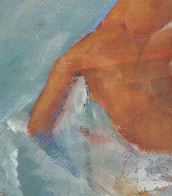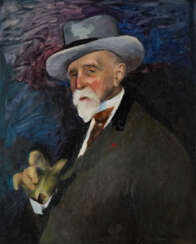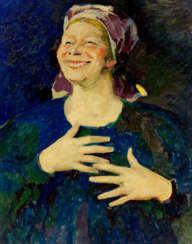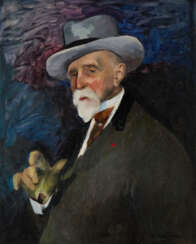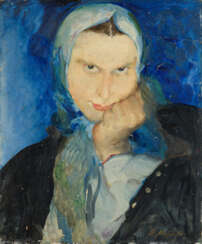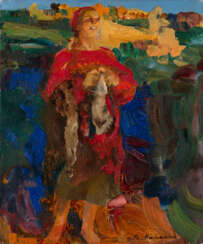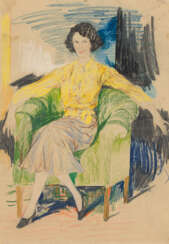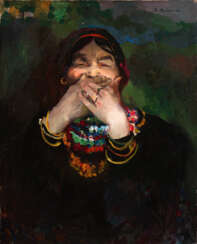Filipp Andreevich Malyavin (1869 - 1940) — Auction price
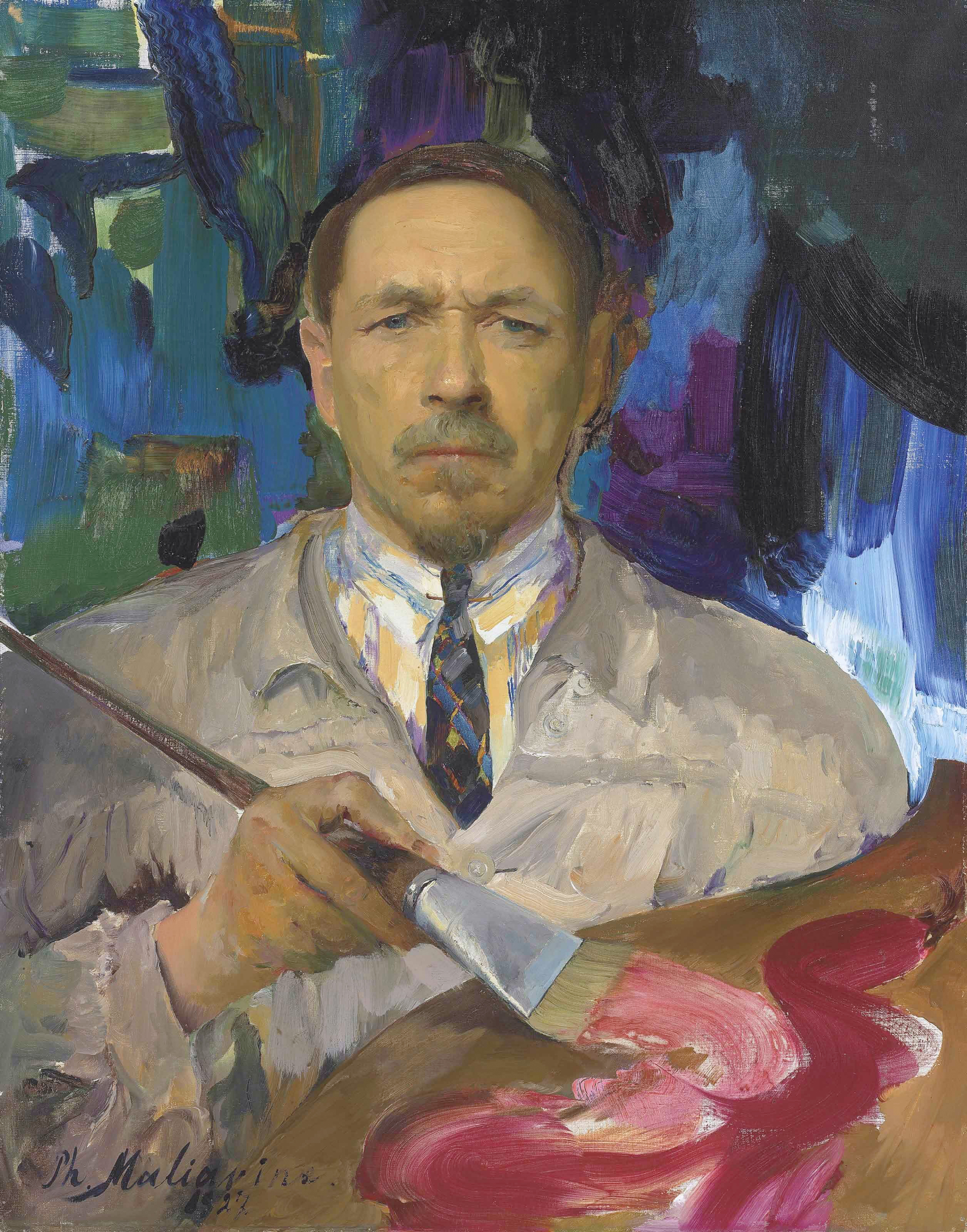
Filipp Andreevich Malyavin (Russian: Филипп Андреевич Малявин) was a Russian artist whose journey from a novice in a monastery to a renowned painter in Europe is as vibrant and eccentric as his artworks. Born into a poor peasant family in the village of Kazanka, Samara province, Malyavin's early fascination with art propelled him from creating clay figurines and drawings in his village to studying under the tutelage of Ilya Repin at the Saint Petersburg Academy of Arts. His unique approach to painting, characterized by large canvases, the bold use of the color red, and dynamic brushstrokes, distinguished his work from his contemporaries.
Malyavin's most notable early works include "Peasant Girl Knitting a Stocking" and "Laughter," the latter of which, despite initial criticism for its unconventional portrayal of Russian women, earned him a gold medal in Paris and was acquired by the Museo d'arte moderno in Venice. His portraits, such as those of Baroness Wolf and Mme. Popova, along with his depiction of peasant life, brought him fame both in Russia and abroad.
His art reflects the rich colors and patterns of the traditional clothes of the Kazanka peasants, bringing a sense of cheerfulness and vitality that transcended the somber reality of peasant life. His work "Three Babas" exemplifies this style, capturing the women in vibrant attire against a rural backdrop, conveying a sense of nostalgia for his homeland after his emigration in 1922.
For collectors and experts in art and antiques, Malyavin's works offer a unique glimpse into the soul of Russian peasant life, infused with an exuberance and color that set them apart from the works of his peers. His pieces, such as "Whirlwind," "Laughter," and "Peasant Women," are celebrated for their distinctive style and emotional depth, making them valuable additions to any collection.
To stay updated on sales and auction events related to Filipp Andreevich Malyavin, sign up for updates. This subscription will ensure you're the first to know about new opportunities to acquire pieces by this distinguished artist, whose work captures the spirit of Russian culture with unparalleled vibrancy and emotion.
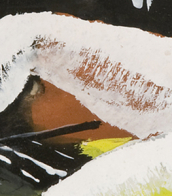

Filipp Andreevich Malyavin (Russian: Филипп Андреевич Малявин) was a Russian artist whose journey from a novice in a monastery to a renowned painter in Europe is as vibrant and eccentric as his artworks. Born into a poor peasant family in the village of Kazanka, Samara province, Malyavin's early fascination with art propelled him from creating clay figurines and drawings in his village to studying under the tutelage of Ilya Repin at the Saint Petersburg Academy of Arts. His unique approach to painting, characterized by large canvases, the bold use of the color red, and dynamic brushstrokes, distinguished his work from his contemporaries.
Malyavin's most notable early works include "Peasant Girl Knitting a Stocking" and "Laughter," the latter of which, despite initial criticism for its unconventional portrayal of Russian women, earned him a gold medal in Paris and was acquired by the Museo d'arte moderno in Venice. His portraits, such as those of Baroness Wolf and Mme. Popova, along with his depiction of peasant life, brought him fame both in Russia and abroad.
His art reflects the rich colors and patterns of the traditional clothes of the Kazanka peasants, bringing a sense of cheerfulness and vitality that transcended the somber reality of peasant life. His work "Three Babas" exemplifies this style, capturing the women in vibrant attire against a rural backdrop, conveying a sense of nostalgia for his homeland after his emigration in 1922.
For collectors and experts in art and antiques, Malyavin's works offer a unique glimpse into the soul of Russian peasant life, infused with an exuberance and color that set them apart from the works of his peers. His pieces, such as "Whirlwind," "Laughter," and "Peasant Women," are celebrated for their distinctive style and emotional depth, making them valuable additions to any collection.
To stay updated on sales and auction events related to Filipp Andreevich Malyavin, sign up for updates. This subscription will ensure you're the first to know about new opportunities to acquire pieces by this distinguished artist, whose work captures the spirit of Russian culture with unparalleled vibrancy and emotion.
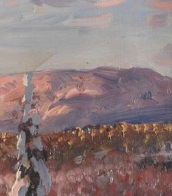

Filipp Andreevich Malyavin (Russian: Филипп Андреевич Малявин) was a Russian artist whose journey from a novice in a monastery to a renowned painter in Europe is as vibrant and eccentric as his artworks. Born into a poor peasant family in the village of Kazanka, Samara province, Malyavin's early fascination with art propelled him from creating clay figurines and drawings in his village to studying under the tutelage of Ilya Repin at the Saint Petersburg Academy of Arts. His unique approach to painting, characterized by large canvases, the bold use of the color red, and dynamic brushstrokes, distinguished his work from his contemporaries.
Malyavin's most notable early works include "Peasant Girl Knitting a Stocking" and "Laughter," the latter of which, despite initial criticism for its unconventional portrayal of Russian women, earned him a gold medal in Paris and was acquired by the Museo d'arte moderno in Venice. His portraits, such as those of Baroness Wolf and Mme. Popova, along with his depiction of peasant life, brought him fame both in Russia and abroad.
His art reflects the rich colors and patterns of the traditional clothes of the Kazanka peasants, bringing a sense of cheerfulness and vitality that transcended the somber reality of peasant life. His work "Three Babas" exemplifies this style, capturing the women in vibrant attire against a rural backdrop, conveying a sense of nostalgia for his homeland after his emigration in 1922.
For collectors and experts in art and antiques, Malyavin's works offer a unique glimpse into the soul of Russian peasant life, infused with an exuberance and color that set them apart from the works of his peers. His pieces, such as "Whirlwind," "Laughter," and "Peasant Women," are celebrated for their distinctive style and emotional depth, making them valuable additions to any collection.
To stay updated on sales and auction events related to Filipp Andreevich Malyavin, sign up for updates. This subscription will ensure you're the first to know about new opportunities to acquire pieces by this distinguished artist, whose work captures the spirit of Russian culture with unparalleled vibrancy and emotion.


Filipp Andreevich Malyavin (Russian: Филипп Андреевич Малявин) was a Russian artist whose journey from a novice in a monastery to a renowned painter in Europe is as vibrant and eccentric as his artworks. Born into a poor peasant family in the village of Kazanka, Samara province, Malyavin's early fascination with art propelled him from creating clay figurines and drawings in his village to studying under the tutelage of Ilya Repin at the Saint Petersburg Academy of Arts. His unique approach to painting, characterized by large canvases, the bold use of the color red, and dynamic brushstrokes, distinguished his work from his contemporaries.
Malyavin's most notable early works include "Peasant Girl Knitting a Stocking" and "Laughter," the latter of which, despite initial criticism for its unconventional portrayal of Russian women, earned him a gold medal in Paris and was acquired by the Museo d'arte moderno in Venice. His portraits, such as those of Baroness Wolf and Mme. Popova, along with his depiction of peasant life, brought him fame both in Russia and abroad.
His art reflects the rich colors and patterns of the traditional clothes of the Kazanka peasants, bringing a sense of cheerfulness and vitality that transcended the somber reality of peasant life. His work "Three Babas" exemplifies this style, capturing the women in vibrant attire against a rural backdrop, conveying a sense of nostalgia for his homeland after his emigration in 1922.
For collectors and experts in art and antiques, Malyavin's works offer a unique glimpse into the soul of Russian peasant life, infused with an exuberance and color that set them apart from the works of his peers. His pieces, such as "Whirlwind," "Laughter," and "Peasant Women," are celebrated for their distinctive style and emotional depth, making them valuable additions to any collection.
To stay updated on sales and auction events related to Filipp Andreevich Malyavin, sign up for updates. This subscription will ensure you're the first to know about new opportunities to acquire pieces by this distinguished artist, whose work captures the spirit of Russian culture with unparalleled vibrancy and emotion.
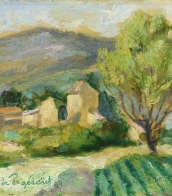

Filipp Andreevich Malyavin (Russian: Филипп Андреевич Малявин) was a Russian artist whose journey from a novice in a monastery to a renowned painter in Europe is as vibrant and eccentric as his artworks. Born into a poor peasant family in the village of Kazanka, Samara province, Malyavin's early fascination with art propelled him from creating clay figurines and drawings in his village to studying under the tutelage of Ilya Repin at the Saint Petersburg Academy of Arts. His unique approach to painting, characterized by large canvases, the bold use of the color red, and dynamic brushstrokes, distinguished his work from his contemporaries.
Malyavin's most notable early works include "Peasant Girl Knitting a Stocking" and "Laughter," the latter of which, despite initial criticism for its unconventional portrayal of Russian women, earned him a gold medal in Paris and was acquired by the Museo d'arte moderno in Venice. His portraits, such as those of Baroness Wolf and Mme. Popova, along with his depiction of peasant life, brought him fame both in Russia and abroad.
His art reflects the rich colors and patterns of the traditional clothes of the Kazanka peasants, bringing a sense of cheerfulness and vitality that transcended the somber reality of peasant life. His work "Three Babas" exemplifies this style, capturing the women in vibrant attire against a rural backdrop, conveying a sense of nostalgia for his homeland after his emigration in 1922.
For collectors and experts in art and antiques, Malyavin's works offer a unique glimpse into the soul of Russian peasant life, infused with an exuberance and color that set them apart from the works of his peers. His pieces, such as "Whirlwind," "Laughter," and "Peasant Women," are celebrated for their distinctive style and emotional depth, making them valuable additions to any collection.
To stay updated on sales and auction events related to Filipp Andreevich Malyavin, sign up for updates. This subscription will ensure you're the first to know about new opportunities to acquire pieces by this distinguished artist, whose work captures the spirit of Russian culture with unparalleled vibrancy and emotion.
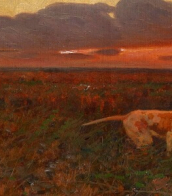

Filipp Andreevich Malyavin (Russian: Филипп Андреевич Малявин) was a Russian artist whose journey from a novice in a monastery to a renowned painter in Europe is as vibrant and eccentric as his artworks. Born into a poor peasant family in the village of Kazanka, Samara province, Malyavin's early fascination with art propelled him from creating clay figurines and drawings in his village to studying under the tutelage of Ilya Repin at the Saint Petersburg Academy of Arts. His unique approach to painting, characterized by large canvases, the bold use of the color red, and dynamic brushstrokes, distinguished his work from his contemporaries.
Malyavin's most notable early works include "Peasant Girl Knitting a Stocking" and "Laughter," the latter of which, despite initial criticism for its unconventional portrayal of Russian women, earned him a gold medal in Paris and was acquired by the Museo d'arte moderno in Venice. His portraits, such as those of Baroness Wolf and Mme. Popova, along with his depiction of peasant life, brought him fame both in Russia and abroad.
His art reflects the rich colors and patterns of the traditional clothes of the Kazanka peasants, bringing a sense of cheerfulness and vitality that transcended the somber reality of peasant life. His work "Three Babas" exemplifies this style, capturing the women in vibrant attire against a rural backdrop, conveying a sense of nostalgia for his homeland after his emigration in 1922.
For collectors and experts in art and antiques, Malyavin's works offer a unique glimpse into the soul of Russian peasant life, infused with an exuberance and color that set them apart from the works of his peers. His pieces, such as "Whirlwind," "Laughter," and "Peasant Women," are celebrated for their distinctive style and emotional depth, making them valuable additions to any collection.
To stay updated on sales and auction events related to Filipp Andreevich Malyavin, sign up for updates. This subscription will ensure you're the first to know about new opportunities to acquire pieces by this distinguished artist, whose work captures the spirit of Russian culture with unparalleled vibrancy and emotion.


Filipp Andreevich Malyavin (Russian: Филипп Андреевич Малявин) was a Russian artist whose journey from a novice in a monastery to a renowned painter in Europe is as vibrant and eccentric as his artworks. Born into a poor peasant family in the village of Kazanka, Samara province, Malyavin's early fascination with art propelled him from creating clay figurines and drawings in his village to studying under the tutelage of Ilya Repin at the Saint Petersburg Academy of Arts. His unique approach to painting, characterized by large canvases, the bold use of the color red, and dynamic brushstrokes, distinguished his work from his contemporaries.
Malyavin's most notable early works include "Peasant Girl Knitting a Stocking" and "Laughter," the latter of which, despite initial criticism for its unconventional portrayal of Russian women, earned him a gold medal in Paris and was acquired by the Museo d'arte moderno in Venice. His portraits, such as those of Baroness Wolf and Mme. Popova, along with his depiction of peasant life, brought him fame both in Russia and abroad.
His art reflects the rich colors and patterns of the traditional clothes of the Kazanka peasants, bringing a sense of cheerfulness and vitality that transcended the somber reality of peasant life. His work "Three Babas" exemplifies this style, capturing the women in vibrant attire against a rural backdrop, conveying a sense of nostalgia for his homeland after his emigration in 1922.
For collectors and experts in art and antiques, Malyavin's works offer a unique glimpse into the soul of Russian peasant life, infused with an exuberance and color that set them apart from the works of his peers. His pieces, such as "Whirlwind," "Laughter," and "Peasant Women," are celebrated for their distinctive style and emotional depth, making them valuable additions to any collection.
To stay updated on sales and auction events related to Filipp Andreevich Malyavin, sign up for updates. This subscription will ensure you're the first to know about new opportunities to acquire pieces by this distinguished artist, whose work captures the spirit of Russian culture with unparalleled vibrancy and emotion.


Filipp Andreevich Malyavin (Russian: Филипп Андреевич Малявин) was a Russian artist whose journey from a novice in a monastery to a renowned painter in Europe is as vibrant and eccentric as his artworks. Born into a poor peasant family in the village of Kazanka, Samara province, Malyavin's early fascination with art propelled him from creating clay figurines and drawings in his village to studying under the tutelage of Ilya Repin at the Saint Petersburg Academy of Arts. His unique approach to painting, characterized by large canvases, the bold use of the color red, and dynamic brushstrokes, distinguished his work from his contemporaries.
Malyavin's most notable early works include "Peasant Girl Knitting a Stocking" and "Laughter," the latter of which, despite initial criticism for its unconventional portrayal of Russian women, earned him a gold medal in Paris and was acquired by the Museo d'arte moderno in Venice. His portraits, such as those of Baroness Wolf and Mme. Popova, along with his depiction of peasant life, brought him fame both in Russia and abroad.
His art reflects the rich colors and patterns of the traditional clothes of the Kazanka peasants, bringing a sense of cheerfulness and vitality that transcended the somber reality of peasant life. His work "Three Babas" exemplifies this style, capturing the women in vibrant attire against a rural backdrop, conveying a sense of nostalgia for his homeland after his emigration in 1922.
For collectors and experts in art and antiques, Malyavin's works offer a unique glimpse into the soul of Russian peasant life, infused with an exuberance and color that set them apart from the works of his peers. His pieces, such as "Whirlwind," "Laughter," and "Peasant Women," are celebrated for their distinctive style and emotional depth, making them valuable additions to any collection.
To stay updated on sales and auction events related to Filipp Andreevich Malyavin, sign up for updates. This subscription will ensure you're the first to know about new opportunities to acquire pieces by this distinguished artist, whose work captures the spirit of Russian culture with unparalleled vibrancy and emotion.
